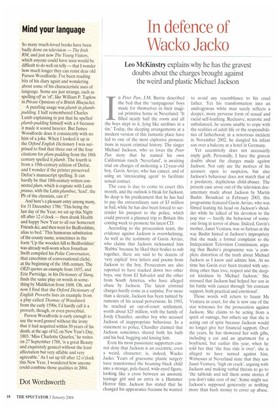Mind your language
So many much-loved books have been badly done on television — The Irish RM, and just now The Young Visiters, which anyone could have seen would be difficult to do well on telly — that I wonder how much longer they can resist dear old Parson Woodforde. I've been reading bits of his diary again and wondering about some of his characteristic uses of language. Some are just strange, such as spelling off as 'or, like William P. Taplow in Private Opinions of a British Bluejacket.
A puzzling usage was plumb in plumbpudding. I half remembered Charles Lamb explaining in jest that he spelled plumb-pudding himself with a b because it made it sound heavier. But James Woodforde does it consistently with no hint of a joke. When I looked it up in the Oxford English Dictionary I was surprised to find that three out of the four citations for plum-pudding from the 18th century spelled it plumb. The fourth is from a 19th-century edition of Defoe, and I wonder if the printer preserved Defoe's manuscript spelling. It can hardly be that 18th-century writers connectedp/um, which is cognate with Latin prunus, with the Latin plumbus, 'lead', the Pb of the chemists, can it?
And here's a pleasant entry among many, for 31 December 1786: 'This being the last day of the Year, we sat up this Night till after 12 o'clock — then drank Health and happy New Year to all our Somersett Friends &c, and then went for Bedfordshire, alias to bed.' This humorous substitution of the county name, sometimes in the form 'Up the wooden hill to Bedfordshire' was already well-worn when Jonathan Swift compiled his Polite Conversation, that catechism of conversational cliché, at the beginning of the 18th century. The OED quotes an example from 1655, and Eric Partridge, in his Dictionary of Slang, finds the same play on words in something by Middleton from 1608. Oh, and now I find that the Oxford Dictionary of English Proverbs lists an example from a play called Thomas of Woodstock from the early 1590s; I'd hardly call it a proverb, though, or even proverbial.
Parson Woodforde is early enough to use the word genteel without the irony that it had acquired within 50 years of his death, at the age of 62, on New Year's Day, 1803. 'Miss Charlotte Quarles,' he writes on 27 September 1788, 'is a great Beauty and exquisitely genteel without the least affectation but very affable and very agreeable.' As I sat up till after 12 o'clock this New Year, I wondered how anyone could combine those qualities in 2004.
Dot Wordsworth


























































 Previous page
Previous page